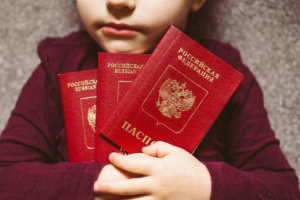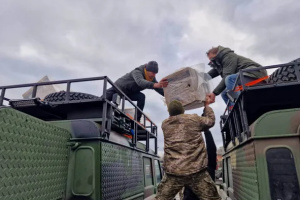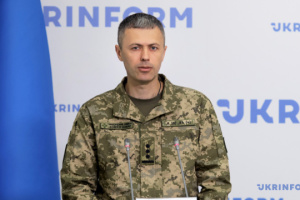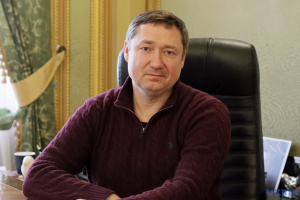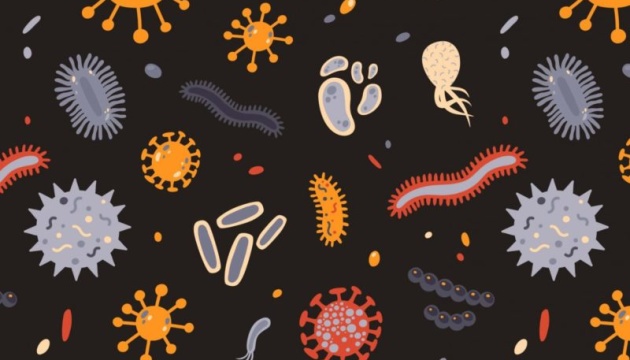
Ukrainian journalists draw list of Putinism agents in 19 European countries
These are both foreigners and Russians who live in Europe and can be used as instruments of influence of Russian special services. The project was granted an eloquent name — The Germs of “Russian World.”
The base included, for example, politicians who voted for pro-Russian decisions, expressed statements in support of Putin and the war, and called for the lifting of sanctions against Russia.
The functionality allows choosing a country, as well as a field of activity: politics, public activity, media, education / science, church, compatriots, political expert, culture, business, honorary consul, state propaganda, and sports. Currently, there are 19 countries in the database, of which 17 are EU members: Austria, Belgium, Bulgaria, Denmark, Ireland, Spain, Italy, Hungary, Germany, the Netherlands, France, the Czech Republic, Slovakia, Poland, Romania, Greece, and Sweden. The other two are Serbia and the United Kingdom.
The study indicates that Putinism is trying to use migrants — “compatriots” as a tool for its operations in Europe.
For example, the Rossotrudnichestvo agency — a descendant of all Soviet services for working with emigrants — is de facto a cover in which agents of various intelligence agencies work, first of all, the Foreign Intelligence Service (FIS). Employees of the “Russian houses” or the Russian centers of science and culture, as the offices of Rossotrudnichestvo in European countries are called, are often employees of the FIS.
The base of The Germs of the “Russian World” included the current officers of the FIS: Pavel Izvolsky from the Berlin “Russian House” and Igor Zhukovsky in Warsaw; Dmitry Sokolov, the former head in Vienna, and Yevgeny Demin, the former deputy in Belgrade.
Earlier, analysts of the Robert Lansing Institute wrote about the affiliation of Daria Pushkova, the head of the “Russian House” in Paris, with the FIS. Elena Epishina, the head of the RCSC (Russian Centre for Science and Culture) in Bratislava, formerly worked as a military attaché of the embassy, which is impossible without having a rank in the special services.
Rossotrudnichestvo coordinates, in particular, “immortal regiments” and other rallies that help promote the narratives of Russian propaganda through the creation of “newsbreaks” in the form of rallies and petitions, as well as the organization of conferences and roundtables.
As a result, rallies are organized with the participation of locals to promote Kremlin propaganda under the guise of historical truth. This platform is also used to develop business projects in the interests of the Kremlin and for scientific espionage.
The Danish newspaper Information provides one example in its investigation.
Artem Markaryan, head of the “Russian House” in Denmark, organized contacts with the Danish Technological University. Professors were invited to conferences dedicated to space and Arctic research, attended by representatives of Russian scientific institutions as well. As a result, Markaryan managed to get an employee of the “Russian House” to work at the university. Subsequently, several employees of the university of Russian origin were exposed as spies who had passed information about green technologies from a scientific institution and its partners — commercial companies — to the Russian special services.
Russia has a more or less formalized friendship group with almost every country — a bilateral trade and/or cultural association, often there can be several for one country. There are also associations at the regional level.
The practical tool of the Russian special services for penetration into the business world was the institution of “honorary consuls,” which was also analyzed by researchers in a piece “Honorary Henchmen of the Kremlin. How does a Network of Diplomacy Implicated in Big Money Work?”
The honorary consul is a special diplomatic status, which is received not by professional staff members of the Ministry of Foreign Affairs of a foreign country, but by local citizens of European countries. The appointment, however, takes place after approval by the local Ministry of Foreign Affairs. In addition to official documents and the ability to protect the rights of citizens of the represented state, honorary consuls receive diplomatic immunity, inviolability of correspondence, complicated procedures for searches of the premises, and the opportunity to use diplomatic license plates.
Honorary consuls are often serious businessmen from European countries or dishonest hustlers. The study proves that 34 acting honorary consuls represent Russia in 18 European countries. Another 17 had this status until recently, but with the beginning of the full-scale invasion, they either left their positions on their own, or were forced to stop this work due to the closure of the consulates by the host country. Former consuls often remain part of a pro-Russian network of “shadow diplomacy.”
For example, the honorary consul of Russia in Crete owns the largest Greek hotel chain Grecotel Nikos Daskalantonakis. Putin personally awarded Daskalantonakis the Order of Friendship for the development of Russia-Greece cooperation. This person is also a co-organizer of the “Victory Day” celebrations in Crete.
Many other consuls represent the big food business. For example, the consul in Greenland is Miki Jonas Brøns, the owner of the largest fishing company of Greenland Polar Seafood. He inherited this position from his father. By the way, you can buy shrimp from Polar Seafood almost in every large supermarket chain in Ukraine. The consul of Russia in Burgos (Spain) is Pedro Ballvé Lantero, one of the owners of the large international food holding Campofrio. In addition, the interests of Russians are protected by Hubert Bertsch, the head of the Bertsch corporation, a producer of equipment for the food industry (honorary consul in Vorarlberg, Austria). Another Austrian consul in Graz is Michael Pachleitner, head of the optics giant Michael Pachleitner Group.
The honorary consulate in Nuremberg was headed by Nicholas Knauf, the head of Knauf — one of the largest corporations for the production of building materials. Together with Wintershall Dea, another German company and a former partner of Gazprom, they, according to the media, actively helped supply the Russian army. By the way, one of the Knauf factories in Ukraine in Soledar was destroyed by Russian invaders.
A separate area is the promotion of Putinism through Russian studies. After Russia’s full-scale invasion of Ukraine in February 2022, governments and civic activists in European countries began to look more closely at Russian schools and Ruscist associations. A certain number of such associations publicly condemned the aggression of the Russian army (partly with slips like “we sympathize with all the victims — both Ukrainians and Russians, we will continue to carry the Russian language and culture as a way of interethnic understanding”). A significant part continued to work to promote the Russian language, culture, and the “Russian” perspective. Every year, Russia invests in hundreds of conferences and competitions to promote Russian culture, which today cannot but go hand in hand with Russian neo-Nazism.
As for politicians, as we know, one of the points of support of Russian interests in Europe is political parties, usually either extreme right or extreme left. Some of them, like the League in Italy or Alternative for Germany, are outright Putinists. Others may publicly condemn the war and at the same time promote the idea of weakening sanctions or continuing economic ties with Russians despite the aggression against Ukraine.
Pro-Russian politicians were often invited to joint right- or left-radical forums sponsored, if not directly from the Russian budget, then by various patrons, like the main “Orthodox oligarch” Konstantin Malofeev.
The base also included fans of Putin and the “quick ruble” from various national and regional parliaments who came to the occupied Crimea, Donetsk, and Luhansk to attend conferences, festivals, roundtables, created mythical “embassies of the LPR/DPR” in Europe and promoted the idea of “normality” of political dialogue and business with terrorists and invaders in every way possible. Politicians from Germany, France, Bulgaria, Italy, and Greece were particularly active in attempts to “recognize” Crimea as Russian.
Among the media, Russia is openly promoted mainly by either conspiracy (“alternative”) or pro-radical (right and left) publications, which are notable for their general Eurosceptic and anti-American rhetoric and anti-government sentiments.
Moscow is also creating think tanks and civil society organizations in Europe. The most striking are the Institute of Democracy and Cooperation in France and the Dialogue of Civilizations Research Institute in Berlin. For example, the Eurasian Observatory for Democracy and Elections, founded by Belgian activist Luc Michel, specializes in “observing” elections in unrecognized and undemocratic states, creating an illusion of their legitimacy.
Several “journalists,” such as Graham Phillips from the UK, Alina Lipp from Germany, Liu Sivaya from Spain, Fabrice Beor from Belgium, etc., specialize in spreading the “truth about how the children of the Donbas were bombed.”
The Center for Strategic Communication and Information Security spoke with one of the authors of the study, journalist Oleksii Nabozhniak.
Oleksii, what did your research reveal?
The networks of Russian influence are ramified and decentralized. We have identified at least 10 areas in which Putin’s supporters work. This means that control and monitoring of these areas should also be ramified.
We did not have the goal of inducing to include the persons on our list in the sanctions lists of Europe or Ukraine. But I was surprised to see that sanctions were imposed in Ukraine only against about 100 people from our list.
One of the criteria for entering The Germs of Russian World database was an illegal visit to Crimea and the temporarily occupied territories in the east of Ukraine. Observers at pseudo-referenda fall under the category of persons Ukraine imposes sanctions on. But we did not find many persons from this category in the NACP register as of the beginning of March 2023. And this may be the next step for the work of the very NACP.
As for European sanctions, perhaps a single action of their citizens will not be enough for them. But the question can and should be asked in the ethical plane and regarding the reputation of these individuals. The Russian attack unleashed a war that in certain aspects can be compared with the hostilities of World War II, so one cannot help the aggressor that violated the basic rules.
Our task was to record this list for history and if, in the future, these people appeared in new “active operations” on the part of Russia, it would be easier to expose their intentions.
What stories of agents do you recall?
It’s hard to remember one story. I’ll dwell on categories. I discovered a large network of “Cossacks” in Europe. A person lives an everyday life, but once a month, roughly, changes into a Cossack uniform, comes to congresses, “Victory Day,” and other activities. This is interesting because it is a paramilitary structure that has certain power attributes, whips, or perhaps even some weapons.
The discovery was that many great businessmen were honorary consuls of Russia. The owner of the largest hotel chain in Greece, the owner of Knauf. Russia invested a lot in regional self-government bodies. This can be seen in the example of Germany, Italy, when, in addition to the level of the national parliament, very active cooperation took place with regional lands that were associated with the construction of the Nord Stream.
Weren’t lovers of Putin’s Russia disappointed after the full-scale attack on Ukraine, like the “romantics of Communism” after the Soviet attack on Czechoslovakia in 1968?
Yes, some politicians switched sides and denied the pro-Russian statements that they had made before. They began to vote in parliament for anti-Russian initiatives. However, some German and Austrian parties remained within their positions. If a politician follows an “alternative” policy with a typical set — against the EU, NATO, and believes that “the United States enslaved everyone” — they continue following Russian narratives. They can sincerely believe to be on the side of the good, or that business relations with Russia are important for the economy of their region.
Was your project noticed in Europe?
The coverage of the English-language text in the first weeks after the release of “The Germs” in December last year was 3 times higher than that of the Ukrainian one. For example, in Belgium, journalists also asked themselves the question: who in our country supports Russia. Based on our data, as far as I know, the list of potential agents at least doubled. Several researchers from universities who study propaganda and disinformation have also requested that we provide them with an array of data. The topic was of interest to the Polish media, there were stories covered in the news, and now they will make a documentary story based on our project. It was our idea to encourage further detailed research.
When we presented this study to the European Commission and other foreign partners, they were surprised by the scale. Everyone knew that there were “agents,” but when they saw their number, everyone in their country on the infographic — it was a reason to think. Russian information operations in the world are a well-known fact, but when people see the scale, it motivates them to act and explore the topic further.
The number of points for each country corresponds to real data after the first revision of the database when 1,300 persons were recorded. Their location is random within the country. The third update of the database already featured more than 2,100 individuals.
In which countries are there a lot of Russian agents?
Germany, France, Italy, and the UK. These are countries with a large population, and therefore they account for many individuals.
What would be your advice toward solving the problem of Putin’s malign influence on Europe and the world?
The first thing is monitoring. To know where and how Russians work. Such bases need to be expanded. We found people from open sources who were mentioned in various studies, monitoring lists, such as, for example, “observers” over fake elections in the territory of occupied Ukraine. And how many more other hidden agents of influence there can be, or those who are ordinary members of organizations because in many cases, we included only managers in the list and did not consider other employees. The main thing is to understand the scale. This provides a vector for further effort.
Then we can go on to analyze which of these groups pose the greatest threats to the countries in which they are located. You can communicate with the authorities of the country to strengthen monitoring. There are counter-intelligence measures — the special services already know about this — what to do about it, how to neutralize the threat. The task of a society is to make others realize the malign influence of Putinism, its threats, and to encourage them to respond to this challenge.
What is the situation of the media in Europe?
There is a category of conspiracy and traditionalist media that often advocate anti-American rhetoric and support for Russia. These are often right-wing media and pro-communist leftists.
If we discuss the main media and journalism — we have not found blatant cases of unequivocal support for Russia in the major media. Although, of course, they can give a voice to dubious experts, with a position bordering pro-Russian and neutral, for “world peace,” which, in our conditions, hides a desire of the aggressor to regain strength.
Which politicians does Putinism engage, and how does it work?
Left, right, it doesn’t matter. Their main goal is to create confusion and division within a country. They may be communists or ultra-nationalists. The more different the categories are, the better. This “recruitment” occurs not only directly through special services but also through the financing of political and public organizations and think tanks — both directly and through foundations, friendly organizations in the EU — so that it is not immediately possible to trace financial flows.
What other research can be done? What would you advise your fellow journalists?
If we talk about Russian agents of influence, there are countries that are not covered by our research. We did not consider Portugal, Luxembourg, Norway, the Baltic countries, Finland, Croatia, Montenegro, Bosnia, and Cyprus. Thus, firstly, a geographic expansion.
Secondly, one can explore connections that may be deeper. We just made a big list with a breakdown by country, industry, and reason for being on the list. In addition, you can look for deeper ties with Russia. We, for example, did not try to look for whether those foreigners who got into our base had business in Russia, or whether they were heads of enterprises owned by Russians. Soon, we will release a base of lobbyists for Russian business, and there is also something to work on in this direction.
And, of course, there are other regions. For example, there is Africa, where levels of influence are unknown and where media and political landscapes are not as transparent as in Europe, where more information can be found from open sources. There are Asia, the Middle East, Southeast Asia, and the Americas — these are large regions where Ukraine needs to work to represent its position, to investigate the narratives of Putinism, and through whom they are spread.
Journalists have one tool — to cover, to refer a request, to find out what the authorities are doing to overcome the problem. Ukrainian communities of IDPs already know public Russian agents of influence. They often hold protests, rallies, and appeals. But we need to understand that it is necessary to record violations by Russians. Because if a person simply advocates the position in favor of Russia and Putin — this is not prohibited by law. But it is necessary to record that a person can be a source of risk.
Center for Strategic Communication and Information Security

